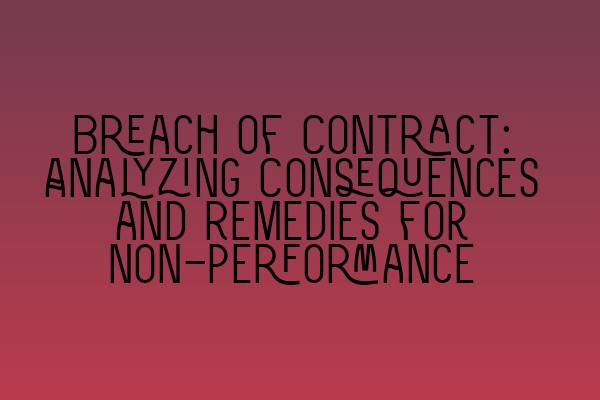As a solicitor specializing in contract law, one of the most common issues I come across is breach of contract. A breach of contract occurs when one party fails to fulfill their obligations under the terms of an agreement. In such cases, it is important to analyze the consequences and remedies available for non-performance.
Consequences of Breach of Contract
When a breach of contract occurs, there are several possible consequences that may arise. The specific consequences will depend on the nature and severity of the breach, as well as the terms of the contract. Some of the common consequences include:
- Compensation: The innocent party may be entitled to claim damages for any losses suffered as a result of the breach. These damages can be in the form of monetary compensation.
- Specific Performance: In certain cases, the court may order the breaching party to perform their obligations under the contract. This is known as specific performance.
- Termination of the Contract: The innocent party may choose to terminate the contract and claim damages for any losses incurred as a result of the breach.
- Rescission: Rescission is a remedy that allows the innocent party to cancel the contract and return to the pre-contract position.
- Injunction: In some cases, the court may grant an injunction to prevent the breaching party from taking certain actions or to compel them to perform their obligations.
It is important to note that the specific remedies available will depend on the circumstances of each case and may vary under different contract laws. Therefore, it is advisable to seek legal advice from a qualified solicitor to determine the most appropriate remedy in your particular situation.
Legal Considerations
When dealing with a breach of contract, it is essential to consider various legal aspects. One crucial consideration is the type of breach that has occurred. A breach can be classified as either a material breach or a minor breach.
A material breach is a significant violation of the terms of the contract that goes to the root of the agreement. In such cases, the innocent party may have the right to terminate the contract and claim damages. On the other hand, a minor breach is a less significant violation that does not go to the core of the agreement. In these situations, the innocent party may be entitled to claim damages, but termination of the contract may not be an option.
Another important consideration is the concept of anticipatory breach. An anticipatory breach occurs when one party clearly communicates their intention not to perform their obligations under the contract before the time for performance arrives. In such cases, the innocent party may be justified in terminating the contract and claiming damages without waiting for the actual breach to occur.
Conclusion
In conclusion, breach of contract is a complex legal issue with various consequences and remedies. When faced with a breach, it is essential to analyze the specific circumstances to determine the appropriate course of action. Seeking legal advice from a qualified solicitor who specializes in contract law is crucial to ensure a favorable outcome.
If you are preparing for the SQE exam and looking for practice materials, be sure to check out our related articles:
- SQE 1 Practice Exam Questions
- SQE 1 Practice Mocks FLK1 FLK2
- SQE 2 Preparation Courses
- SQE 1 Preparation Courses
- SRA SQE Exam Dates
